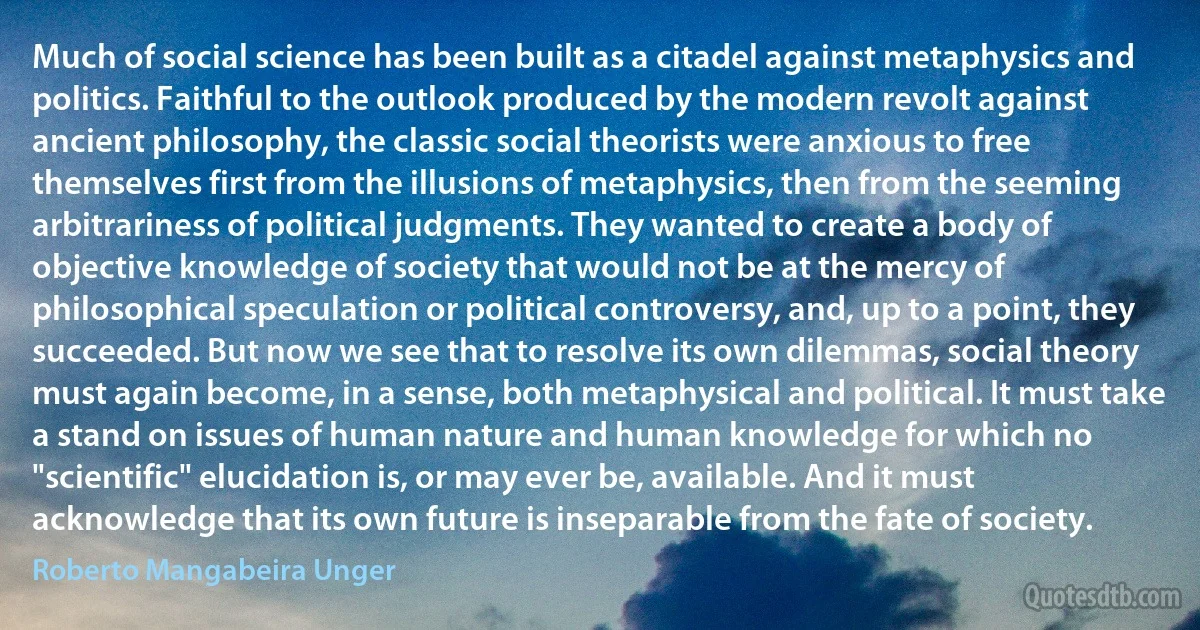
Much of social science has been built as a citadel against metaphysics and politics. Faithful to the outlook produced by the modern revolt against ancient philosophy, the classic social theorists were anxious to free themselves first from the illusions of metaphysics, then from the seeming arbitrariness of political judgments. They wanted to create a body of objective knowledge of society that would not be at the mercy of philosophical speculation or political controversy, and, up to a point, they succeeded. But now we see that to resolve its own dilemmas, social theory must again become, in a sense, both metaphysical and political. It must take a stand on issues of human nature and human knowledge for which no "scientific" elucidation is, or may ever be, available. And it must acknowledge that its own future is inseparable from the fate of society.
Roberto Mangabeira UngerRelated topics
arbitrariness body built citadel controversy elucidation faithful fate free future human inseparable knowledge mercy metaphysics nature now objective outlook point politics revolt science see sense speculation stand takeRelated quotes
This morning I received a letter from de Bellio. He writes that he does not believe scientific research into the nature of color and light can help the artist, neither can anatomy nor the laws of optics. He wants to discuss these questions with me and find out my views. Now everything depends on how this knowledge is to be used. But surely it is clear that we could not pursue our studies of light with much assurance if we did not have as a guide the discoveries of Chevreul and other scientists. I would not have distinguished between local color and light if science had not given us the hint; the same holds true for complementary colors, contrasting colors, etc. 'Yes', he will tell me: 'but these have always been taken into account, look at Monet' It is at this point that the question becomes serious!

Camille Pissarro
It is impossible for any man, when the most favourable circumstances concur, to acquire sufficient knowledge and strength of mind to discharge the duties of a king, entrusted with uncontrolled power; how then must they be violated when his very elevation is an insuperable bar to the attainment of either wisdom or virtue; when all the feelings of a man are stifled by flattery, and reflection shut out by pleasure! Surely it is madness to make the fate of thousands depend on the caprice of a weak fellow creature, whose very station sinks him NECESSARILY below the meanest of his subjects! But one power should not be thrown down to exalt another--for all power intoxicates weak man; and its abuse proves, that the more equality there is established among men, the more virtue and happiness will reign in society.

Mary Wollstonecraft
Neophil: ...Leibniz, Wolff, and their various successors, to what a level of perfection and completeness they have brought philosophy! How proud Germany can be of them! Yet what does it help to claim more for oneself than is right? Let us always acknowledge that someone other than a German, I add further, someone other than a Christian, namely, Spinoza, has participated immensely in the work of bettering philosophy. Before the transition from the Cartesian to the Leibnizian philosophy could occur, it was necessary for someone to take the plunge into the monstrous abyss lying between them. This unhappy lot fell to Spinoza. How his fate is to be pitied! He was a sacrifice for the human intellect, but one that deserves to be decorated with flowers. Without him, philosophy would never have been able to extend its borders so far.

Baruch Spinoza
Spontaneous social action will be broken up over and over again by State intervention; no new seed will be able to fructify. Society will have to live for the State, man for the governmental machine. And as, after all, it is only a machine whose existence and maintenance depend on the vital supports around it, the State, after sucking out the very marrow of society, will be left bloodless, a skeleton, dead with that rusty death of machinery, more gruesome than the death of a living organism. Such was the lamentable fate of ancient civilisation. ... Already in the times of the Antonines (IInd Century), the State overbears society with its anti-vital supremacy. Society begins to be enslaved, to be unable to live except in the service of the State. The whole of life is bureaucratised. What results? The bureaucratisation of life brings about its absolute decay in all orders.

José Ortega y Gasset
And as for the close connection between philosophy and poetry, we can refer to a little-known statement by Thomas Aquinas in his Commentary on Aristotle's Metaphysics [I, 3]: the Philosopher is akin to the Poet in this, that both are concerned with the mirandum, the "wondrous," the astonishing, or whatever calls for astonishment or wonder. This statement is not that easy to fathom, since Thomas, like Aristotle, was a very sober thinker, completely opposed to any Romantic confusion of properly distinct realms. But on the basis of their common orientation towards the "wonderful" (the mirandum - something not to be found in the world of work!) - on this basis, then, of this common transcending-power, the philosophical act is related to the "wonderful," is in fact more closely related to it than to the exact, special sciences; to this point we shall return.

Josef Pieper
